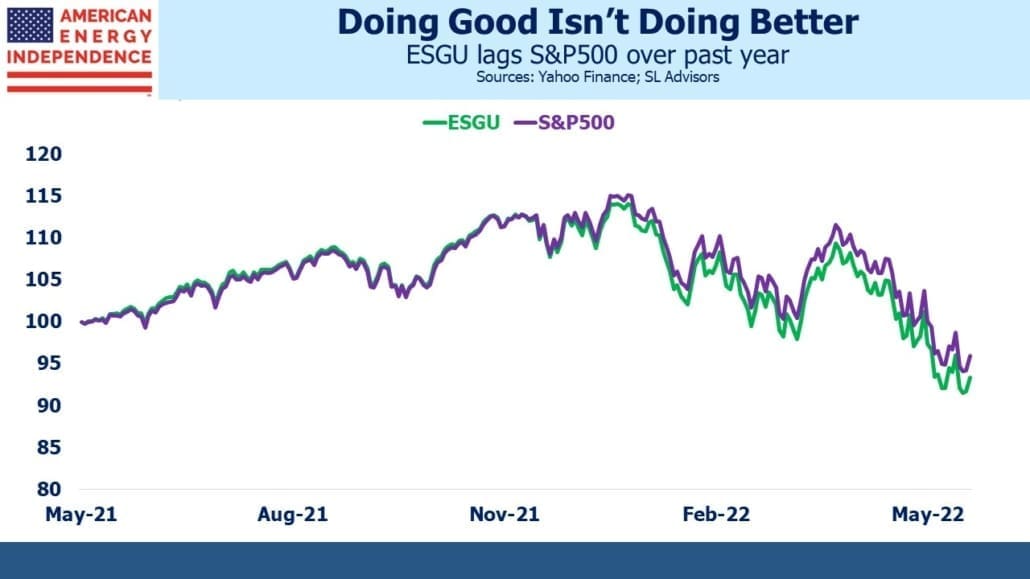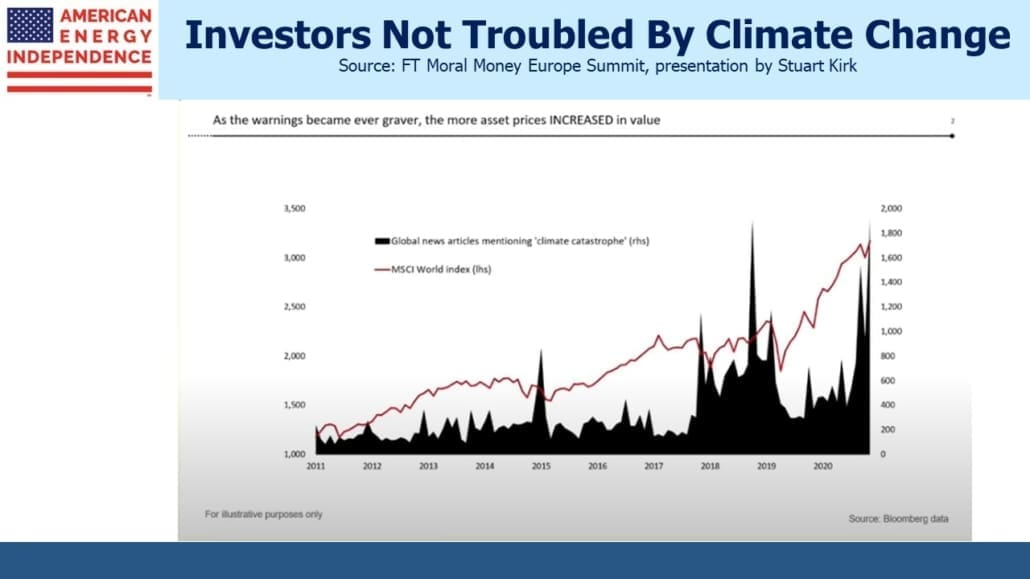ESG Has No Clothes

/
Offering investments tailored to ESG (Environmental, Social and Governance) criteria is a growing source of fee income for Wall Street. Morningstar calculates that 65 US funds have been repackaged into ESG funds since the beginning of 2019. Investors are attracted by the notion of holding virtuous stocks, but companies and fund managers must also find the flexibility around what constitutes an ESG-eligible stock to be appealing too.
A year ago we looked at the then-largest ESG ETF, the iShares ESG Aware MSCI USA ETF (ESGU), which had $15BN in AUM (see Pipelines Are ESG). ESGU looks so much like the S&P500 that their returns are 0.99 correlated.
In the past year, ESGU has lagged the S&P500 by 2.5%. This underperformance has come just as the concept is coming under fire. Tesla (which is in ESGU) was dropped from S&P’s ESG index, prompting CEO Elon Musk to tweet that “ESG is a scam. It has been weaponized by phony social justice warriors.”
Musk is right that it’s a scam, although he hadn’t been a vocal critic until recently. Tesla was dropped even though its “ESG score” was stable, because its sector peers improved theirs. S&P explained that it’s not enough to be “taking fuel-powered cars off the road.”
Tesla drivers are passionate owners, but many overlook that 61% of US electricity generation is from fossil fuels, including coal (22%). It varies by state, but buyers of electric vehicles in Kentucky, West Virginia and Wyoming where coal dominates electricity production (69%, 88% and 80% respectively) are generating more harmful emissions than if they bought a conventional car.
Tesla was the biggest company to be dropped, but others included Berkshire Hathaway and Johnson and Johnson. Wells Fargo was dropped for being non-compliant with the United Nations Global Compact, which says it’s “the world’s largest corporate sustainability initiative”.
HSBC’s head of responsible investing, Stuart Kirk, may have given his swansong by accusing policymakers of overstating the financial risks of climate change. In a delightfully incongruous presentation at the FT’s Moral Money Europe Conference, he said, “there was always some nut job telling me about the end of the world.” His message was a rejection of the orthodoxy which often lapses into hyperbolic predictions that life as we know it is in its final decade.
Kirk notes that the projections of economic loss are inconsequential. The UN’s IPCC report estimates as much as a 5% loss of global GDP by 2100 due to climate change. This is a trivial impact given that even 2.5% annual growth by then will leave the economy 6.86X bigger than it is today. If it’s only 6.52X bigger instead, few will care. It’s the difference between annual growth of 2.5% and 2.433%. Global stock markets aren’t visibly affected by the jump in news articles mentioning “climate catastrophe”.
Kirk is obviously ready for a career change. He complained about the inordinate time he spends with regulators discussing HSBC’s climate exposure, when he sees much more immediate threats such as cybercrime, inflation and pandemics. He has been suspended pending an internal review. Stuart Kirk will likely become a hero to those who believe that adaptation to a warmer planet deserves more attention than it receives.
ESG is being exposed as the emperor with no clothes. The SEC is about to crack down on misleading ESG investment claims by fund managers. SEC chair Gary Gensler said “It is easy to tell if milk is fat free. It might be time to make it easier to tell whether a fund is really what they say they are.”
Gensler might care to examine the Dow Jones Sustainability North America Index, whose owners display a sense of humor by continuing to include defense contractors Lockheed Martin and Northrop Grumman as constituents.
The main problem with ESG is its infinite malleability. ESGU, which now has $23BN in AUM, includes almost the entire S&P500. If everything is ESG, then nothing is. There is no clear differentiating feature. It’s been taken over by index providers and fund managers who have identified the profit potential in creating virtue-signaling investment products. ESG’s most important quality has been in attracting fund flows, which used to cause modest outperformance until the last year or so.
Unlike Dow Jones, ESGU doesn’t regard defense contractors as promoting sustainability, one reason why it’s been lagging the S&P500. However, it does include midstream energy infrastructure companies such as Kinder Morgan and Oneok. Cheniere is an addition since our last review of ESGU a year ago, but they have inexplicably dropped Williams Companies.
The Energy Information Administration tells us that biggest driver of America’s falling CO2 emissions has been switching power generation from coal to natural gas. Pipeline companies and Cheniere are doing more to keep the planet sustainable than any other company we can think of.
Elon Musk and Stuart Kirk are only the latest to challenge groupthink that has determined orthodoxy on climate change and the definition of doing good. There should be more to come.
We have three funds that seek to profit from this environment:
Please see important Legal Disclosures.

Important Disclosures
The information provided is for informational purposes only and investors should determine for themselves whether a particular service, security or product is suitable for their investment needs. The information contained herein is not complete, may not be current, is subject to change, and is subject to, and qualified in its entirety by, the more complete disclosures, risk factors and other terms that are contained in the disclosure, prospectus, and offering. Certain information herein has been obtained from third party sources and, although believed to be reliable, has not been independently verified and its accuracy or completeness cannot be guaranteed. No representation is made with respect to the accuracy, completeness or timeliness of this information. Nothing provided on this site constitutes tax advice. Individuals should seek the advice of their own tax advisor for specific information regarding tax consequences of investments. Investments in securities entail risk and are not suitable for all investors. This site is not a recommendation nor an offer to sell (or solicitation of an offer to buy) securities in the United States or in any other jurisdiction.
References to indexes and benchmarks are hypothetical illustrations of aggregate returns and do not reflect the performance of any actual investment. Investors cannot invest in an index and do not reflect the deduction of the advisor’s fees or other trading expenses. There can be no assurance that current investments will be profitable. Actual realized returns will depend on, among other factors, the value of assets and market conditions at the time of disposition, any related transaction costs, and the timing of the purchase. Indexes and benchmarks may not directly correlate or only partially relate to portfolios managed by SL Advisors as they have different underlying investments and may use different strategies or have different objectives than portfolios managed by SL Advisors (e.g. The Alerian index is a group MLP securities in the oil and gas industries. Portfolios may not include the same investments that are included in the Alerian Index. The S & P Index does not directly relate to investment strategies managed by SL Advisers.)
This site may contain forward-looking statements relating to the objectives, opportunities, and the future performance of the U.S. market generally. Forward-looking statements may be identified by the use of such words as; “believe,” “expect,” “anticipate,” “should,” “planned,” “estimated,” “potential” and other similar terms. Examples of forward-looking statements include, but are not limited to, estimates with respect to financial condition, results of operations, and success or lack of success of any particular investment strategy. All are subject to various factors, including, but not limited to general and local economic conditions, changing levels of competition within certain industries and markets, changes in interest rates, changes in legislation or regulation, and other economic, competitive, governmental, regulatory and technological factors affecting a portfolio’s operations that could cause actual results to differ materially from projected results. Such statements are forward-looking in nature and involves a number of known and unknown risks, uncertainties and other factors, and accordingly, actual results may differ materially from those reflected or contemplated in such forward-looking statements. Prospective investors are cautioned not to place undue reliance on any forward-looking statements or examples. None of SL Advisors LLC or any of its affiliates or principals nor any other individual or entity assumes any obligation to update any forward-looking statements as a result of new information, subsequent events or any other circumstances. All statements made herein speak only as of the date that they were made. r
Certain hyperlinks or referenced websites on the Site, if any, are for your convenience and forward you to third parties’ websites, which generally are recognized by their top level domain name. Any descriptions of, references to, or links to other products, publications or services does not constitute an endorsement, authorization, sponsorship by or affiliation with SL Advisors LLC with respect to any linked site or its sponsor, unless expressly stated by SL Advisors LLC. Any such information, products or sites have not necessarily been reviewed by SL Advisors LLC and are provided or maintained by third parties over whom SL Advisors LLC exercise no control. SL Advisors LLC expressly disclaim any responsibility for the content, the accuracy of the information, and/or quality of products or services provided by or advertised on these third-party sites.
All investment strategies have the potential for profit or loss. Different types of investments involve varying degrees of risk, and there can be no assurance that any specific investment will be suitable or profitable for a client’s investment portfolio.
Past performance of the American Energy Independence Index is not indicative of future returns.




Leave a Reply
Want to join the discussion?Feel free to contribute!